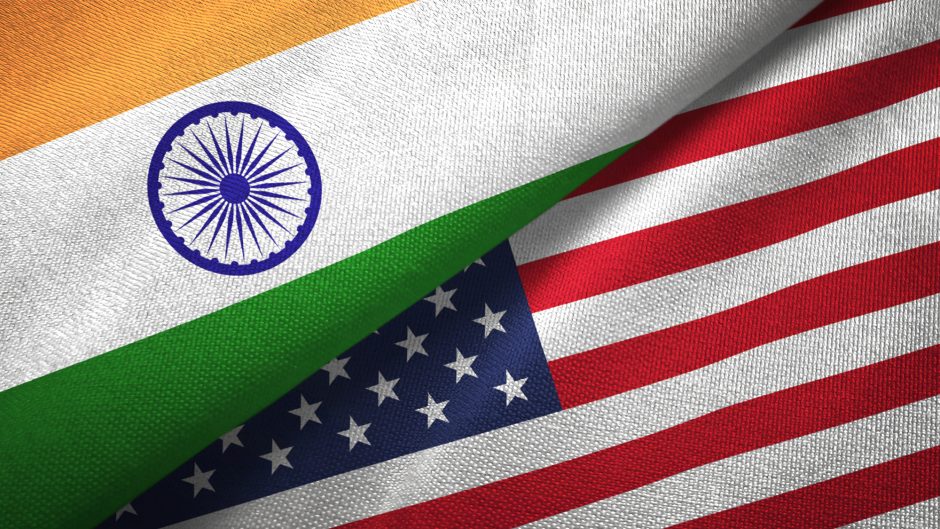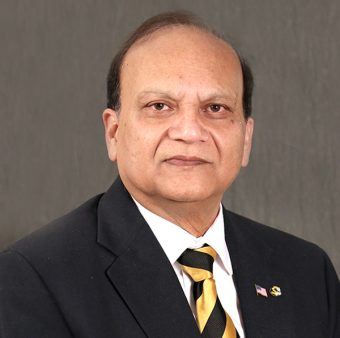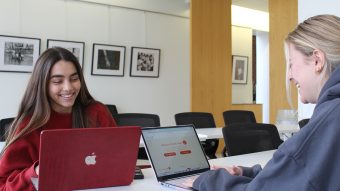
Nov. 14, 2023
Contact: Courtney Perrett, 573-882-6217, cperrett@missouri.edu
Rajiv Mohan grew up in Sitapur, a city nestled in the north of India. When he was young, Mohan’s grandfather donated a portion of land to establish Sitapur Eye Hospital, the first community hospital designed exclusively to treat eye disease in India. This gesture, along with witnessing various family members battle vision problems, inspired Mohan to study medicine.
As a Curators’ Distinguished Professor of Ophthalmology and Molecular Medicine in the University of Missouri’s School of Medicine and College of Veterinary Medicine, Mohan is excited to give back to the community that raised him. Because of his breadth of experience in the biomedical field and his relationships with researchers in India, he was selected to serve as leader of the Provost’s Task Force with India, a new MU initiative that aims to improve research collaborations between the United States and India.
As part of a greater vision by the Association of American Universities (AAU), the task force will involve several collaborators across MU, including scientists in agriculture, telecommunications, artificial intelligence and materials, chemistry and medicine.
“India is one of the world’s fastest-growing world economies and represents a rich environment for scientific discovery,” said Provost Latha Ramchand. “This task force was formed to make recommendations to the President that would strengthen MU’s research partnerships with faculty at institutions in India, increase MU enrollment of students from India and facilitate exchange programs that would enhance programmatic opportunities for faculty and students from both countries. Our mission is to bring scientists driving innovation in their fields together to spearhead solutions to some of the world’s foremost problems and to recruit talented students to our institution.”
Responsible for directing the biomedical research arm of the task force, Mohan is excited about the prospects he envisions for multidisciplinary collaborations, including expanding opportunities for students from India to study at MU.
“As a public, land-grant university, MU should be a leader in the state of Missouri for attracting international students to study here,” Mohan said. “This outreach effort is intended to help expose prospective international students to the enormous possibilities we have here in terms of furthering both their education and research pursuits.”
Building blocks of success
After training as a pharmaceutical chemist at Lucknow University and Central Drug Research Institute in India, Mohan arrived in the U.S. in the early ’90s to study molecular biology and gene therapy at the Cleveland Clinic — training that formed the basis for his research success using nanomedicine.

Now, Mohan’s primary focus is developing precision gene therapy-based interventions for treating corneal disease, which is an eye disease that can cause clouding of the cornea that can eventually lead to blindness.
“Blindness is a major issue in India and even reaches epidemic levels in many countries in Africa,” Mohan said. “This is because many of the people are exposed to harmful chemical and biological agents, whether in the water they’re using or in cleaning chemicals or substances where they work. Once the cornea gets infected and becomes opaque, a person goes blind.”
Corneal disease, however, is more prevalent than people might think. It’s common in veterans and people exposed to biochemical warfare, Mohan said, explaining that the three organs most affected in wars are the skin, lungs and eyes.
To treat corneal disease, Mohan has developed an eye drop that can be easily applied in less-than-sterile circumstances and uses a nanoparticle or virus vector to deliver therapeutic genes that reverses fibrosis — the process of the cornea becoming opaque — restoring a person’s vision over time.
As part of the task force, medical students and researchers from India will join Mohan in his lab to learn about and workshop this nanomedicine with the eventual goal of getting an approved treatment on the market. Likewise, the task force will support medical students at MU with opportunities to study abroad and participate in global health scholar programs at top medical schools in India.
“I’m thrilled to be part of this task force,” Mohan said. “I think a part of this journey is my destiny, and I’m excited for our future contributions to global medicine and well-being.”



